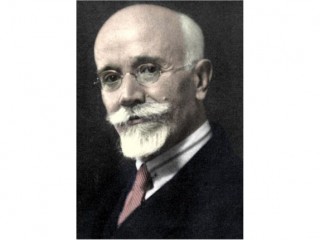
Eleutherios Venizelos biography
Date of birth : 1864-08-23
Date of death : 1936-03-18
Birthplace : Canea, Crete
Nationality : Greek
Category : Politics
Last modified : 2011-03-28
Credited as : Statesman, Prime Minister of Greece,
The Greek statesman Eleutherios Venizelos ranks as the most important figure in early-20th-century Greek politics. He won his country over to the Allied side in World War I and then achieved prominence as an international statesman.
Eleutherios Venizelos was born near Canea in Crete on Aug. 23, 1864. He was educated at the University of Athens, but he returned to practice law in his home-land and participate in a rebellion. The failure of an insurrection in 1889 forced him to flee the island, but as a leader of the 1897 revolt, he saw the Turkish hold on Crete finally broken. The Greek government had not fared so well in its own war with Turkey, and Crete was placed under the administration of a consortium of powers (Britain, France, Italy, and Russia) which appointed Prince George of Greece governor.
Venizelos at first headed Prince George's government; but disagreements soon drove Venizelos into rebellion and unilateral declaration of Greek-Cretan unity. In 1906 Prince George returned to the mainland, and his opponent settled down to a routine career in provincial politics. Unification of island and mainland was finally sealed by the First Balkan War (1912).
Meanwhile, Venizelos's activities had brought him to the attention of Greek political circles. When the Military League seized power in 1909, he was called to Athens, where he was put into office as a reforming prime minister under a revised constitution. Venizelos held office from 1910 to 1915. During this period he reformed the internal administration and strengthened the armed forces. In the two Balkan Wars, with Greece first as the ally of and then as the opponent of Bulgaria, his foreign policy paid off in territorial gains for Greece.
The onset of World War I, however, undermined Venizelos's position. The assassination of King George I in 1913 had brought Constantine to the throne. This monarch disliked Venizelos because he had forced the King's younger brother to leave Crete. More importantly, Constantine was sympathetic to the Central Powers, whereas Greece's international commitments bound it to Serbia and to the Allies. Venizelos was the main architect of those commitments, and his efforts to honor them forced his resignation in March 1915.
A subsequent election confirmed Venizelos's support in the country. But his resumption of office in August only reemphasized the contradictions in Greek policy. Bulgaria's mobilization that year forced the King to take similar measures; but Greece maintained its neutral stance, and when the Allies landed at Salonika (October 1915), Venizelos was out of office again.
In September 1916 Venizelos returned to Crete to lead another rebellion, this one against Constantine. His provisional government was recognized by the Allies, and his triumphal return to Athens in June 1917 was preceded by the abdication of Constantine. Greece now openly sided with the Allies. After the armistice, Venizelos departed for Paris, where, during the next 2 years, he reaped Greece's share of the spoils of war.
Unfortunately, a new threat loomed on the horizon. The Turkish nationalist movement led by Kemal Ataturk repudiated the concessions granted the Allies and Greece by Sultan Mohammed VI (Treaty of Sevres, 1920). This meant continued war with Greece. Venizelos's defeat in the election of November 1920 was followed by the recall of Constantine. After the Greek army was beaten to its knees, the king left the throne in September 1922. Venizelos signed the Treaty of Lausanne with Turkey (1923).
Venizelos soon found himself confronted with the popular demand to abolish the monarchy. Despite his difficulties with that institution, he could not agree to the formation of a republic; and with its proclamation in 1924, he was once more exiled from office. Not to be suppressed, however, he was again prime minister, from 1928 to 1932 and briefly in 1933.
By 1935 a movement to restore the monarchy had gained sufficient power to bring King George II to the throne. In Crete, the elderly Venizelos, by now a republican, once more raised the standard of revolt. The plot fizzled; its leader died in Paris on March 18, 1936.
















